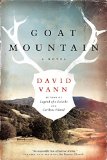Summary | Excerpt | Reviews | Beyond the Book | Read-Alikes | Genres & Themes | Author Bio

This article relates to Goat Mountain
David Vann fits into an American literary tradition that has been around since the 1960s, but was only given a name in 1983. Bill Buford, former editor of Granta literary magazine, coined the term "dirty realism" to characterize two trends in American fiction: a tendency toward simplified language, largely free from adverbs or flowery language (as is true of Vann's matter-of-fact prose in Goat Mountain), and frank consideration of the awfulness of ordinary, lower- or middle-class lives.
A post-Cold War phenomenon, dirty realism arose in an atmosphere of suspicion and paranoia. It often reflects on capitalism and consumerism through the experiences of blue-collar workers, sometimes using black humor to lighten the mood. The characters usually have no hope of escaping the poverty of their circumstances; as Tamas Dobozy notes in his University of British Columbia PhD thesis, "Towards a Definition of Dirty Realism," the dirty realist story "chooses entrapment as its natural habitat." In a subversion of the American dream narrative, the characters find themselves caught in cycles of existential loneliness and meaninglessness – an observation that certainly rings true in relation to the protagonist of Goat Mountain.
Dobozy adds that the genre is "uncluttered, both in style and content," by either experimental techniques or wider historical and social commentary. Some related literary movements are naturalism (a school that includes Theodore Dreiser, Ernest Hemingway, and John Steinbeck), minimalism (which, again, limits stylistic experimentation and linguistic virtuosity), and postmodernism. Granta highlighted such early pioneers of dirty realism as Raymond Carver, Tobias Wolff, Richard Ford, Frederick Barthelme, and Jayne Ann Phillips. Other writers who might be included under the umbrella of dirty realism are Charles Bukowski (known as the "godfather" of the movement), Bobbie Anne Mason, and Louise Erdrich.
British novelist and critic Nick Hornby, in his book Contemporary American Fiction, argues that dirty realism is an "inadequate categorization that doesn't mean very much at all." Yet Dobozy suggests that rather than throwing the term out entirely, it might be possible to add nuances, thinking of it as "less a uniform mass than an aggregate of specific, localized, personal narratives…[for which] disparity supplies their defining characteristic." That disparity, between characters' lofty dreams and the gritty reality of their bleak and impoverished situations, paves the way for the hypocrisy, defeatism, and tragedy that characterize dirty realist plots. Later critics have suggested subgenres like "dirty surrealism," "K-Mart Realism," or "Hick Chic" (the latter two coined by Anne-Marie Karlsson in 1990).
As a counter-cultural phenomenon, dirty realism goes beyond literature, influencing architecture, film and music alike. For instance, the movie Barfly (1987), directed by Barbet Schroeder, was scripted by Bukowski, while Michael Field's Bright Angel (1990) was written by Ford. Likewise, musicians Tom Waits and Bruce Springsteen work in a dirty realist vein. They share with fiction writers an interest in what Buford called "the belly-side of contemporary life," described "with a disturbing detachment, at times verging on comedy. Understated, ironic, sometimes savage, but insistently compassionate." Indeed, it is that very mixture of savagery and compassion that makes Vann's work so powerful.
Filed under Books and Authors
![]() This "beyond the book article" relates to Goat Mountain. It originally ran in November 2013 and has been updated for the
October 2014 paperback edition.
Go to magazine.
This "beyond the book article" relates to Goat Mountain. It originally ran in November 2013 and has been updated for the
October 2014 paperback edition.
Go to magazine.
Your guide toexceptional books
BookBrowse seeks out and recommends the best in contemporary fiction and nonfiction—books that not only engage and entertain but also deepen our understanding of ourselves and the world around us.